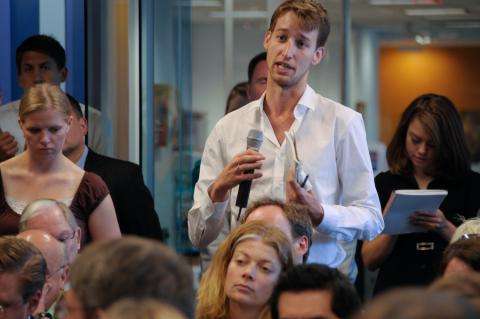A first glance at ASSET citizen consultation

Citizens across Europe participated to the daylong citizen consultations organized by the ASSET project at the end of September. “Citizens were presented with the same information prior and during the day, and deliberated in groups of 6-8 citizen before they voted on central issues in the current European epidemic and pandemic properness and response”, said John Haukeland, from the Danish Board of Technology (Denmark), who led the organization of the event. “At the end of the day the citizens were given the opportunity to write comments or recommendation to the national and European policy-makers”.
ASSET experts are analysing the results of the consultation in order to investigate such a remarkable source of information. While waiting for they analysis to end, we can already draw some first observations on some particular outcomes emerged at local level.
One of the problems highlighted by the consultation involves the information provided by public health authorities. “It’s quite remarkable to note that less than half the Danish citizens are satisfied with the information provided by national health authorities during epidemic treats”, said Haukeland. “This is a real problem and I’m quite this can have consequences, if the Danish health authorities don’t acknowledge that and take steps to mitigate such distrust”.
Being one of the most debated topics in public health, vaccines were involved in many questions. “This consultation underlined the current mood about vaccinations in Italy, with citizens complaining for a strong incomprehension due to a lack of communication”, says Alberto Perra, from the Istituto Superiore di Sanità (Italy). “For instance, a majority of them declared that, in risk conditions, vaccines should be mandatory for most of the population, in order to protect public health. And such a decision, in time of health crisis, is not considered unethical by citizens. Thus, the consultation revealed that citizens are more resolute than we expected on this topic and more prone to strict measures”.
In relation to gender, at a quick glance at the results from all the European countries shows that there is in general not much difference between the genders. However, there were a few points where there was a difference. “When dealing with the principle of distribution of scarce resources like medicine during a pandemic outbreak, both men and women favoured giving priority to health care workers and other people working in important fields” highlighted Vanessa Moore, from the European Institute of Women’s Health (Ireland). “However, women were more likely to prioritise high-risk groups than men”.
And what about the kind of communication channels that public authorities should use during an epidemic or a pandemic? “Both men and women favoured state media and television but, after this, men were more likely to prefer social media while women were more likely to prefer official state webpages”, explained Moore.
More information will be drawn by the complete analysis of the data available but, from these first observations, it is clear that there are some very relevant topics that arose from this consultation. It will be of particular interest to identify any eventual country-specific variation in some responses, since that would provide helpful information for possible local activities. “ASSET has demonstrated that dialogues among citizens at national level can be effective extended to a pan-European scale”, concluded Haukeland. “And this is true even in complex fields as epidemic preparedness, which usually is a field dominated by technical experts”.
